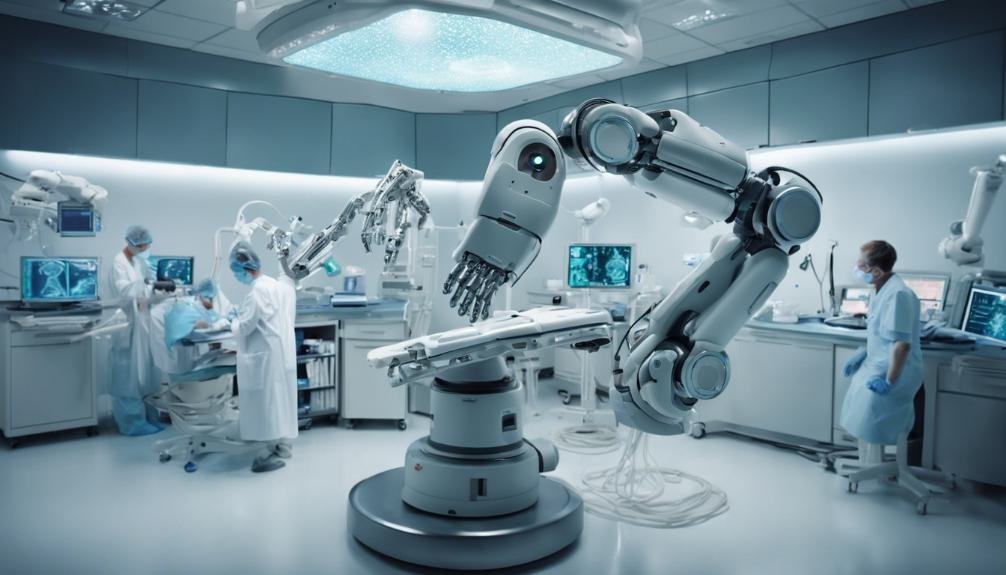AI in Robotic Surgery
As you explore the intricate dance of technology and medicine, it's fascinating how AI has seamlessly woven itself into the domain of robotic surgery. Imagine a scenario where precision meets innovation in the operating room, where machines are not just tools but intelligent assistants. The synergy between artificial intelligence and robotic systems has opened up a world of possibilities, transforming the landscape of surgical interventions. But what exactly does this mean for the future of healthcare and patient outcomes? The implications go beyond mere efficiency; they venture into a domain of enhanced capabilities that could reshape the very fabric of surgical practices.
Key Takeaways
- AI integration enhances surgical precision in robotic procedures.
- Real-time data analysis by AI systems improves decision-making during surgery.
- Machine learning algorithms refine robotic movements for precise incisions.
- Predictive analytics assist in anticipating complications and planning interventions.
- AI integration in robotic surgery enhances patient safety and outcomes.
Evolution of Robotic Surgery
Analyzing the historical trajectory of robotic surgery reveals a significant evolution in technology and surgical techniques over the past few decades. Robotic advancements have played a pivotal role in reshaping the landscape of modern surgery.
The integration of artificial intelligence (AI) in robotic systems has been a cornerstone of this transformation, leading to groundbreaking medical advancements.
The exploration of robotic surgery began with the introduction of robotic systems like the Da Vinci Surgical System, which revolutionized minimally invasive procedures. These systems allowed for greater precision, dexterity, and control during surgeries, enhancing patient outcomes.
Over time, AI integration in robotic surgery has further propelled innovation by enabling machines to learn and adapt based on data inputs, making procedures more efficient and accurate.
The continuous refinement of robotic technologies, coupled with AI integration, has paved the way for enhanced surgical capabilities and improved patient care.
As we investigate further into the domain of surgical innovation, the evolution of robotic surgery stands as a confirmation to the power of technology in advancing the field of medicine.
Benefits of AI Integration
AI integration in robotic surgery offers significant benefits, such as enhanced precision during complex procedures, leading to improved patient outcomes.
The ability of AI systems to analyze vast amounts of data in real-time allows for more accurate decision-making during surgeries.
Precision in Surgeries
Enhancing surgical precision through the seamless integration of artificial intelligence technology has revolutionized the field of robotic surgery, demonstrating significant benefits in improving patient outcomes and reducing complications. Technology advancements in AI have enabled robots to perform surgeries with unparalleled accuracy, surpassing human capabilities in precision.
By utilizing AI-driven data analysis, robotic systems can process vast amounts of information in real-time, enhancing surgical decision-making and overall procedure efficiency.
The ability of AI algorithms to analyze complex data points during surgeries allows for more precise incisions, reduced blood loss, and shorter recovery times for patients. This level of precision is particularly vital in delicate procedures where even the smallest error can have significant consequences.
Integrating AI into robotic surgery not only increases the accuracy of procedures but also enhances the overall safety and effectiveness of surgeries. As AI continues to evolve in the field of robotic surgery, the potential for further advancements in surgical accuracy and procedure efficiency remains promising.
Improved Patient Outcomes
Integrating artificial intelligence technology into robotic surgery has demonstrated a significant enhancement in patient outcomes, showcasing tangible benefits that translate into improved surgical results and recovery rates. By harnessing AI algorithms, surgeons can achieve a higher level of precision, leading to reduced complications during and after procedures. AI's ability to analyze vast amounts of data in real-time allows for more accurate decision-making, ultimately minimizing the risk of errors that could result in post-operative issues.
Moreover, the incorporation of AI in robotic surgery has been pivotal in promoting faster recovery times for patients. Through AI-driven insights, surgical teams can optimize surgical plans tailored to individual patient characteristics, leading to smoother procedures and shorter hospital stays. This streamlined approach not only benefits the patients by facilitating quicker recuperation but also contributes to overall healthcare efficiency.
In essence, the integration of AI technology into robotic surgery not only reduces the likelihood of complications but also plays an important role in expediting the recovery process for patients, thereby enhancing overall patient outcomes.
Enhanced Surgical Precision
Achieving greater accuracy in surgical procedures has been a pivotal outcome resulting from the integration of artificial intelligence in robotic surgery. Surgical automation, enabled by machine learning algorithms and robotics, has greatly enhanced surgical precision. AI algorithms play a vital role in refining the movements of robotic arms, ensuring precise incisions and suturing.
These advancements have minimized human errors, leading to improved surgical outcomes and reduced complication rates. By analyzing vast amounts of data, AI can assist surgeons in making real-time adjustments during procedures, enhancing overall precision.
The combination of robotics and AI technology allows for intricate movements that surpass human capabilities, especially in delicate procedures like microsurgery. Moreover, the integration of AI in robotic surgery enables predictive analytics, helping surgeons anticipate potential complications and plan interventions accordingly.
This proactive approach enhances patient safety and recovery post-surgery. The continuous evolution of AI algorithms in robotic surgery holds promise for further enhancing surgical precision and ultimately improving patient care outcomes.
AI-Assisted Surgical Procedures
The implementation of artificial intelligence in robotic surgery has revolutionized the field by enabling AI-assisted surgical procedures that enhance precision and improve patient outcomes. This surgical innovation involves the integration of AI technology into robotic systems, allowing for more important and efficient procedures.
By leveraging AI algorithms, medical advancements in AI-assisted surgical procedures have greatly enhanced the capabilities of robotic assistance in the operating room. AI technology plays a vital role in optimizing surgical workflows by providing real-time data analysis, predictive modeling, and decision-making support to surgeons. Through machine learning algorithms, AI can analyze vast amounts of data to assist in surgical planning, guidance, and execution.
This integration of AI into robotic assistance systems has led to more precise incisions, reduced operating times, and improved post-operative recovery for patients.
Improved Patient Safety
Enhancing patient safety in robotic surgery through the integration of artificial intelligence has become a paramount focus in the healthcare industry. By leveraging AI technologies, surgical efficiency is greatly improved through data analytics, allowing for a more precise and controlled approach during procedures. AI plays an essential role in risk assessment by analyzing vast amounts of patient data to identify potential complications or adverse events before they occur.
Real-time monitoring in robotic surgery is revolutionized by AI, providing surgeons with immediate feedback on patient vitals and surgical progress. This real-time data enables quick interventions in case of any anomalies, ultimately enhancing patient safety by minimizing the risk of errors during the procedure.
Additionally, AI algorithms can predict potential complications based on the patient's current health status, aiding surgeons in making informed decisions to prevent adverse outcomes.
Future Trends in Healthcare
Future trends in healthcare are heavily influenced by the integration of artificial intelligence, paving the way for innovative advancements in medical practices and patient care. AI advancements are revolutionizing healthcare by enhancing diagnostic accuracy, personalized treatment plans, and operational efficiency.
One of the key areas experiencing significant transformation is surgical innovation, where AI is being integrated into robotic systems to assist surgeons in performing intricate procedures with greater precision and control.
Healthcare transformation driven by AI extends beyond the operating room, impacting areas such as predictive analytics for early disease detection, virtual health assistants for patient monitoring, and predictive modeling for resource allocation. The seamless integration of AI technologies into healthcare systems is streamlining processes, reducing human errors, and ultimately improving patient outcomes.
Moreover, technology integration in healthcare is facilitating remote consultations, telemedicine services, and data-driven decision-making. As AI continues to evolve, the future of healthcare holds promise for more efficient, cost-effective, and patient-centric care delivery models.
The ongoing synergy between AI advancements and healthcare practices underscores a paradigm shift towards a more technologically-driven and patient-focused industry.
Training and Implementation Challenges
You must acknowledge the crucial role of technology in surgical training, considering that AI in robotic surgery requires specialized skills.
The integration of AI systems in operating rooms poses challenges in workflow adaptation and coordination among surgical staff.
Surgeon acceptance and trust in AI-driven technologies are pivotal for successful implementation, necessitating thorough training programs and ongoing support.
Technology in Surgical Training
The implementation of technology in surgical training presents unique challenges that require careful consideration and strategic planning. Simulation training has emerged as an essential component in enhancing surgical skills. By providing a controlled environment for practicing procedures, simulation training allows surgeons to hone their abilities without risking patient safety.
Virtual reality integration takes this a step further by immersing trainees in realistic surgical scenarios, offering a hands-on experience that mimics actual operating conditions. However, despite the benefits of simulation training and virtual reality integration, several challenges exist in their implementation.
Cost is a significant barrier, as acquiring and maintaining advanced simulation technologies can be expensive. Additionally, ensuring that these training methods effectively translate into improved surgical performance requires ongoing evaluation and adjustment. Standardizing simulation protocols and integrating virtual reality seamlessly into existing training programs are also areas that demand attention to maximize the effectiveness of these technologies in surgical education.
Integration in Operating Rooms
Integration of simulation training and virtual reality technologies in operating rooms poses unique challenges related to training and implementation effectiveness. Operating room dynamics demand seamless incorporation of AI technology without disrupting surgical workflows. Surgical team collaboration is essential for the successful integration of AI systems, as communication and coordination are key components of efficient surgical procedures.
AI technology offers benefits such as real-time data analysis, aiding in decision-making and enhancing surgical precision. However, ensuring that these technologies don't interfere with the established protocols and practices in the operating room is a significant challenge. Training staff to effectively utilize AI tools while maintaining focus on patient care requires a delicate balance.
Implementation effectiveness hinges on the acceptance and understanding of AI systems by all members of the surgical team. Overcoming resistance to change and fostering a culture that embraces innovation are vital for the seamless integration of AI technology in operating rooms. By addressing these challenges, the potential benefits of AI in enhancing surgical outcomes can be fully realized.
Surgeon Acceptance and Trust
Amidst the advancement of AI technology in robotic surgery, establishing surgeon acceptance and trust presents critical training and implementation challenges. Surgeon confidence in AI systems plays a pivotal role in successful technology adoption. Training programs need to focus not only on technical skills but also on fostering trust in the capabilities of AI-driven tools.
Studies have shown that while surgeons recognize the potential benefits of AI in surgery, concerns regarding reliability and safety hinder full acceptance. Addressing these apprehensions requires a multifaceted approach that includes transparent communication about AI algorithms' capabilities and limitations.
Effective implementation of AI in robotic surgery necessitates continuous feedback loops where surgeons can provide input to improve the technology actively. This collaborative relationship fosters trust and empowers surgeons to feel in control of the AI tools they're using.
Ethical Considerations in AI
Considering the rapid advancements in artificial intelligence (AI) technology, ethical concerns surrounding its integration into robotic surgery protocols have become increasingly prominent. In the domain of AI in robotic surgery, maintaining data privacy and ensuring algorithm transparency are essential ethical considerations. The handling of sensitive patient information and the transparency of the algorithms used in decision-making processes are paramount to uphold ethical standards in this field.
Moreover, accountability plays a significant role in the ethical implementation of AI in robotic surgery. It's essential to establish clear lines of accountability to address any errors or adverse events that may arise during robotic surgical procedures.
Additionally, the detection and mitigation of biases in AI algorithms are crucial to prevent any discriminatory outcomes in patient care.
Conclusion and Future Outlook
Looking ahead, the advancements in AI technology within robotic surgery are poised to revolutionize the field, paving the way for enhanced precision and improved patient outcomes. AI advancements in robotic surgery have already shown significant promise in assisting surgeons with complex procedures, reducing human error, and shortening recovery times for patients.
The future implications of integrating AI into robotic assistance include the potential for even more precise surgeries through real-time data analysis, personalized treatment plans based on patient-specific data, and improved surgical outcomes overall.
Surgical innovation driven by AI is expected to lead to more efficient procedures, reduced complications, and shorter hospital stays for patients. The ability of AI algorithms to learn from vast amounts of data and adapt to new situations in real-time offers exciting possibilities for the future of robotic surgery.
Conclusion
As you reflect on the transformative impact of AI in robotic surgery, envision the intricate dance between technology and human expertise.
Like a skilled conductor guiding an orchestra, AI orchestrates precision and efficiency in surgical procedures, harmonizing with the surgeon's skill.
This partnership symbolizes the future of healthcare: a seamless integration of innovation and human touch, promising enhanced patient care and better outcomes.
Embrace this symphony of progress, where the possibilities of AI in robotic surgery are endless.







